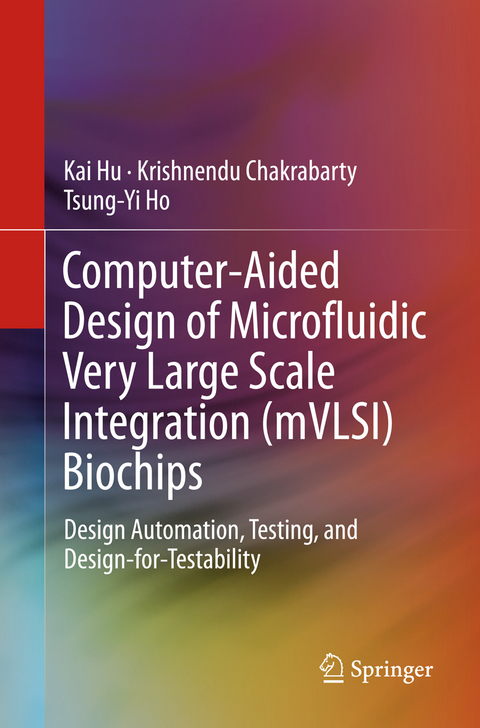
Computer-Aided Design of Microfluidic Very Large Scale Integration (mVLSI) Biochips
Springer International Publishing (Verlag)
978-3-319-85867-8 (ISBN)
Kai Hu received his B. Sci. degree from Fudan University, Shanghai, China, in 2009, and the M.S. and Ph.D. degree from Duke University, NC, USA, in 2011 and 2015, respectively. He was the recipient of the VLSI Test Symposium (VTS) Best Paper Award in 2013, IEEE Transactions on Computer-Aided Design Donald O. Pederson Best Paper Award in 2015, and European Design and Automation Association (EDAA) Outstanding Dissertation Award in 2016. He is currently a Senior Engineer with Oracle. Inc., Santa Clara, CA, USA. His current research interests include algorithms for computer-aided design and testing of flow-based microfluidic biochips. Krishnendu Chakrabarty is the William H. Younger Distinguished Professor of Engineering in the Department of Electrical and Computer Engineering, at Duke University in Durham, NC. He has been at Duke University since 1998. His current research is focused on: testing and design-for-testability of integrated circuits (especially 3D and multicore chips); digital microfluidics, biochips, and cyberphysical systems; optimization of digital print and production system infrastructure. His research projects in the recent past have also included chip cooling using digital microfluidics, wireless sensor networks, and real-time embedded systems. Research support is provided by the National Science Foundation, the Semiconductor Research Corporation, Cisco Systems, HP Labs, Huawei Technologies, and Intel Corporation through Intel Lab's Academic Research Office. Other sponsors in the past have included National Institutes of Health , DARPA and the Office of Naval Research.
Introduction.- Control-Layer Optimization.- Wash Optimization for Cross-Contamination Removal.- Fault Modeling, Testing, and Design-for Testability.- Techniques for Fault Diagnosis.- Conclusion and New Directions.
| Erscheinungsdatum | 29.07.2018 |
|---|---|
| Zusatzinfo | XIII, 142 p. 64 illus., 55 illus. in color. |
| Verlagsort | Cham |
| Sprache | englisch |
| Maße | 155 x 235 mm |
| Gewicht | 2467 g |
| Themenwelt | Mathematik / Informatik ► Informatik ► Theorie / Studium |
| Medizin / Pharmazie ► Physiotherapie / Ergotherapie ► Orthopädie | |
| Technik ► Elektrotechnik / Energietechnik | |
| Schlagworte | design-for-testability in digital microfluidic bio • design-for-testability in digital microfluidic biochips • Digital Microfluidic Biochips • Fault-Tolerant Digital Microfluidic Biochips • Microfluidics Based Microsystems • Microfluidic Very Large Scale Integration |
| ISBN-10 | 3-319-85867-X / 331985867X |
| ISBN-13 | 978-3-319-85867-8 / 9783319858678 |
| Zustand | Neuware |
| Haben Sie eine Frage zum Produkt? |
aus dem Bereich


